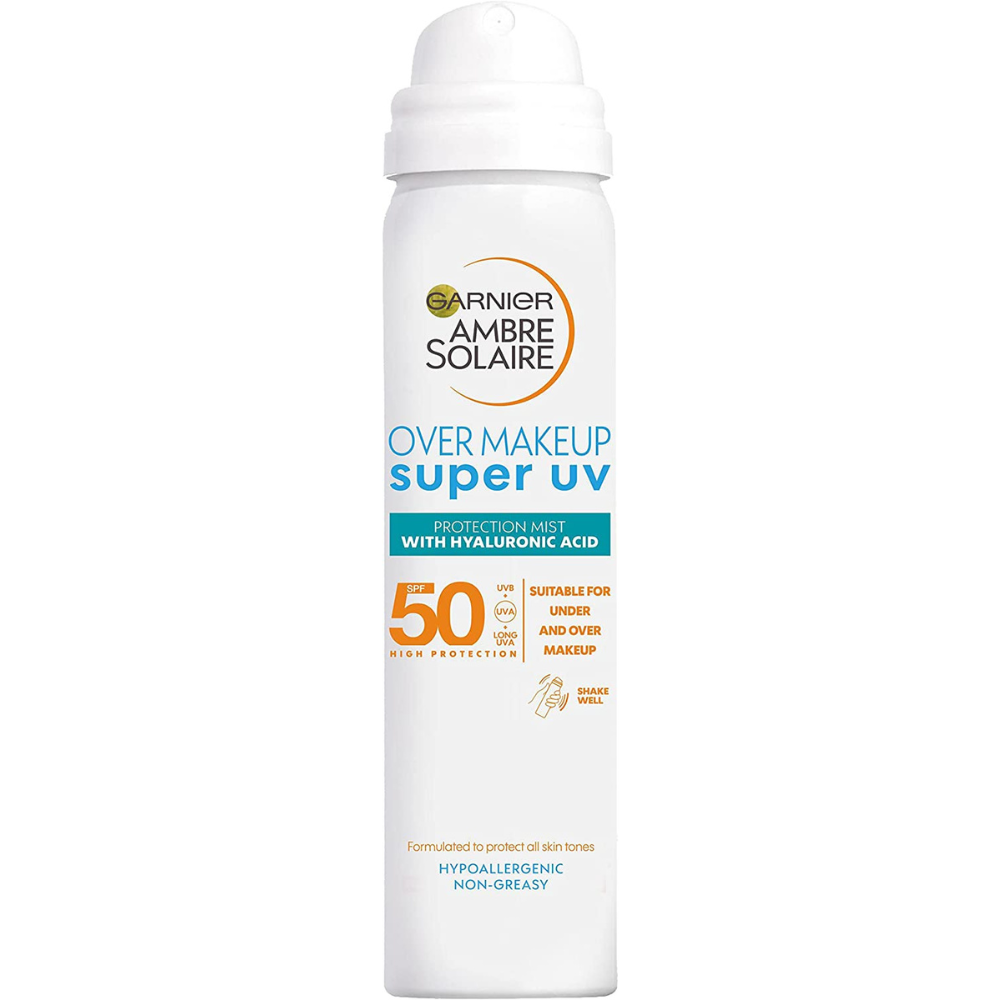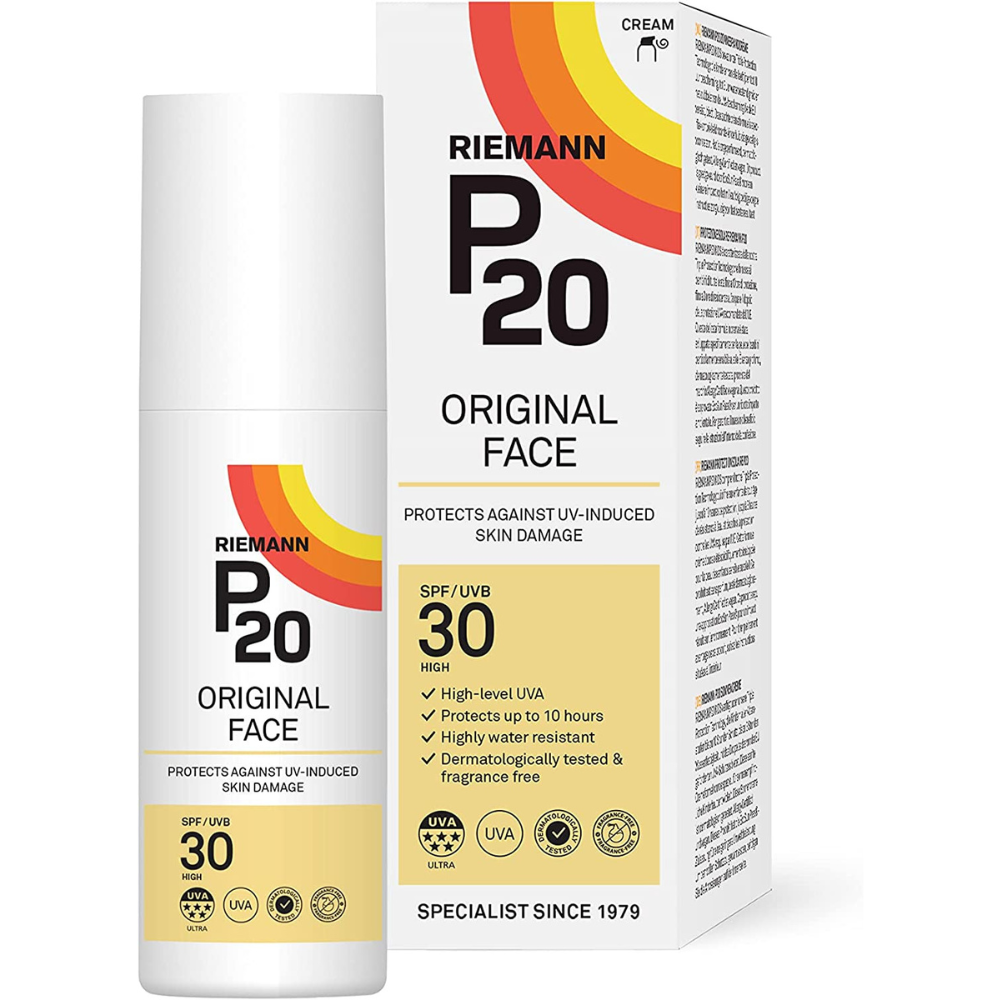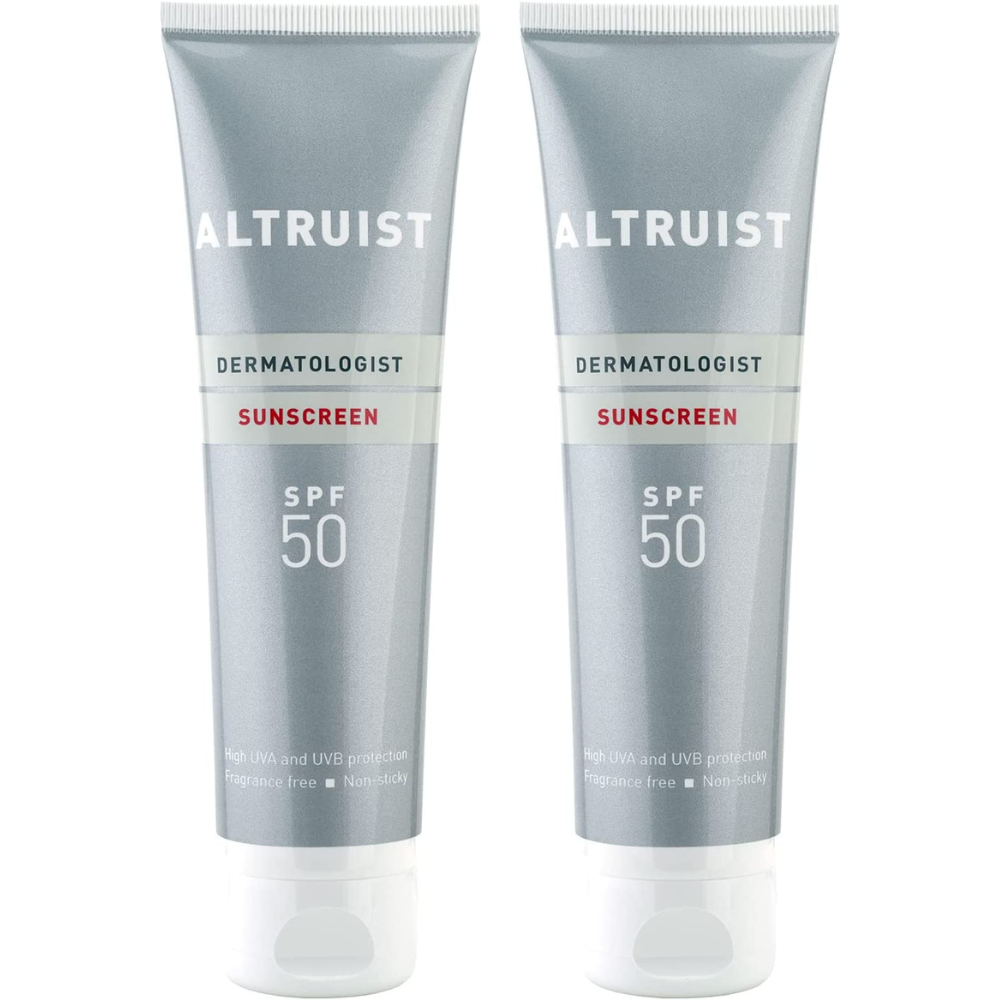The 3 Best Face Sunscreens
Get The Best Protection For Your Face From The Top 3 Sunscreens.

Feeling the heat of summer? We all want to enjoy the sunshine and balmy temperatures without compromising our skin’s health.
Keeping your face sun-protected with a sunscreen is incredibly important, so to help you in that task we have put together a review of our top three facial suncreams on the market. Check out this article to discover which product is best suited for your needs.
As always, our recommendations are based on considerations like SPF ratings and other benefits like broad UV protection and good moisture retention. Read on for more information about each of these star products and what might make them stand out from among many similar offerings.
Garnier Ambre Solaire SPF 50 Super UV Over Makeup Mist for Face, High Protection Against UVA & UVB, Hyaluronic Acid, Light Texture Non Greasy Spray, Invisible Finish, Protects & Hydrates Skin, 75ml
Garnier Ambre Solaire SPF 50 Super UV Over Makeup Mist for Face, High Protection will keep you protected from damaging UV rays while keeping your skin hydrated and nourished.
This mist is formulated to provide high protection suitable for all skin tones, and the ultra-light texture gives an invisible finish on the face without compromising makeup. It is also enriched with hyaluronic acid to nourish the skin on a daily basis.
To ensure safe use on all types of skin, this product has been dermatologically tested to be hypoallergenic and has gained approval from Cruelty Free International’s Leaping Bunny program so that you can feel good about using it. Whenever you step out in the sun make sure to protect your skin with Garnier Ambre Solaire SPF 50 Super UV Over Makeup Mist for Face, High Protection!
Good to know about this product
For women on-the-go, convenience is key. That's why the handy spray bottle of this product has become a fan favourite. With just a few spritzes, application is a breeze and allows for quick touch-ups throughout the day. It's no wonder that most reviews mention how much they love the spray bottle and how it has made their beauty routine so much easier.
As busy women, we appreciate products that work with us, not against us, and this one certainly does just that.
Riemann P20 Face Sun cream SPF30 50 g Long Lasting UVA and UVB Protection for up to 10 hours, Highly Water Resistant
Riemann P20 Face Sun Cream SPF30 50g is the perfect product to keep your face protected from the sun. This best-selling sun cream has been around for a while, as it provides essential and trustworthy protection against UVA and UVB for all members of the family. Its water-resistant formula will last all day long, no matter how often you get in or out of the pool or sea, without leaving any kind of sticky residue.
You can even apply it before your make-up and its pleasant consistency won’t disturb your look. Riemann P20 Face Sun Cream SPF30 50g contains no fancy ingredients, but it does the job perfectly; protecting your delicate skin from damaging UV rays. Get yours today and enjoy a smooth and long lasting protection that will help you stay safe under the sun!
Good to know about this product
Looking for the perfect facial cream can be a challenge, but with the right product, you can achieve the skin you've always wanted. However, it's important to be careful and mindful to choose the right product for your skin type. One consumer review noted this product caused a stinging sensation around the eyes upon application.
This serves as a reminder that, regardless of how natural or pure an ingredient may be, we must always approach skincare with caution and ensure that it's suitable for our individual needs. Especially for women who use a variety of facial products, the skin around the eyes is delicate and should be treated with extra care.
ALTRUIST. Dermatologist Sunscreen SPF 50 – Superior 5-star UVA protection by Dr Andrew Birnie, suitable for sensitive skin - one pack with 2 tubes (100ml x 2 tubes)
Introducing ALTRUIST Dermatologist Sunscreen SPF 50. Created by UK dermatologist Dr Andrew Birnnie and formulated in Germany, this sunscreen offers superior 5-star UVA protection for even the most sensitive skin. It's fast absorption, non-sticky formula feels like a moisturiser- not a sunscreen - and is suitable for daily use on face, body and children, plus it's water resistant.
Plus, you won't have to worry about irritating fragrances or allergies since it's fragrance free with a low risk of allergy. But best of all, you can trust that you're getting the same quality protection that your dermatologist recommends at a truly reasonable price.
Good to know about this product
Altruist's dedication towards supporting and empowering people with albinism in Africa is truly inspiring. It is indeed remarkable that with each product sold, they donate 10 pence to charities that work tirelessly towards supporting people with albinism.
African women with albinism are particularly vulnerable due to societal stigma and lack of proper healthcare. Altruist's contribution of £65,000 worth of sunscreen to individuals with albinism in Africa in 2019 is a shining example of their commitment towards making a positive impact in the world. By uplifting those who are most vulnerable and marginalized, Altruist is setting a remarkable standard of corporate social responsibility that others can surely follow.
Some commonly asked questions about Sunscreen for the Face.
What are the reasons to wear sunscreen?
The importance of wearing suncream every time you step outside cannot be overstated. Not only does it protect your skin from the harmful UVA and UVB rays emitted by the sun, but it also helps to keep your skin healthy and looking its best. Here are some of the key reasons why you should always wear sunscreen:
Sunscreen Prevents Premature Aging: UVA rays can penetrate deeper into the skin and cause wrinkles, age spots, dryness, and a leathery look. Sunscreen prevents these effects by forming a physical barrier between your skin and the sun’s ultraviolet radiation.
Sunscreen Reduces Your Risk For Skin Cancer- Both UVA and UVB radiation has been linked to an increased risk for developing certain types of cancer such as melanoma or squamous cell carcinoma so wearing sunscreen is important in reducing this risk factor significantly.
Sunscreen Protects Against Inflammation And Sunburns- Wearing a good broad spectrum sunscreen will help reduce inflammation caused by exposure to the sun's harmful rays while simultaneously preventing unwanted burns that could potentially damage delicate areas like nose bridges or ears which often have thinner layers of skin than other parts of our bodies. Even if you're not too concerned about getting a tan - it still pays off to put on sunscreen before heading out!
Are there side effects to wearing sunscreen?
It is important to note, however, that the benefits of wearing sunscreen far outweigh any potential risks or adverse effects.
When it comes to short-term side effects, the most common ones are skin irritations and allergies from ingredients found in many sunscreens. These reactions typically occur within minutes of applying the product and can include itching, burning, scaling or redness of the skin. In addition, studies have shown that certain sunscreens containing certain chemical components may cause photosensitization in some individuals when exposed to direct sunlight; this may lead to a rash or other temporary allergic reactions on the area covered by sunscreen.
Longer-term side effects associated with using sunscreen involve a potential increased risk for vitamin D deficiency due to lack of skin exposure from UV radiation from sunlight needed for Vitamin D synthesis in our bodies. Additionally there are ongoing concerns about whether certain chemicals (e.g., oxybenzone) used in some popular brands of sunscreens could be absorbed into our body through topical application leading potentially negative health implications such as endocrine disruption and hormone imbalance over time; however more research is needed in this area before definitive conclusions can be made about these long-term risks associated with frequent use of sunscreens.
Despite these potential drawbacks on using sunscreens mentioned above; there is overwhelming scientific evidence that regular use (and reapplication) of enough amount (1 oz/30 ml - equivalent to shot glass full size) quality broad spectrum SPF 30+ rated sunscreen sold over counter by reputable companies will protect you effectively against harmful UVA & UVB rays which can lead to premature ageing , wrinkles formation , pigmentation spots & cancerous growths over extended periods if unprotected exposure occurs often. It is therefore highly advisable for people particularly those living closer equator regions who spend significant times outside under direct sunlight exposing their whole bodies should wear adequate amount regularly applied directly onto exposed areas instead relying solely on clothing as proper physical barrier against damaging ultraviolet radiations.
What is the correct way to apply sunscreen to face?
Applying sunscreen to the face is a vital step in protecting your skin from sun damage and aging. The correct way to apply suncream to the face can vary depending on the type of sunscreen and your specific skin type, but there are some general guidelines that should be followed.
Before applying any kind of sunscreen or beauty product, make sure you have thoroughly cleansed your face with a gentle cleanser. This removes dirt, oil build-up, makeup (if any), sweat etc., so that when you put your sunscreen into contact with facial skin it works more effectively without having to compete against other debris for absorption into its layers. Once done cleansing the face pat dry gently with a clean place towel - don’t rub! - then wait 5 minutes before moving onto application step which allows all tiny droplets of water left behind after rinsing off cleanser enough time to evaporate from surface area completely… this ensures even coverage during next phase when it comes time to slather up in sunshine solution!
After you've waited those five minutes apply an appropriate amount -- enough so that one full layer covers entire area being protected by product -- making sure no spots get skipped over.
If my moisturiser has a low spf should I still apply sunscreen?
Absolutely! Applying sunblock is an essential step in your daily skincare routine. Even if you have a moisturiser with a low SPF, it doesn’t mean that it offers adequate protection from the sun’s harmful rays.
The Sun Protection Factor (SPF) measures how long UVB radiation (the type of rays that cause sunburn and are linked to cancer) impacts the skin before it reaches its burning threshold. The lower the SPF number, the shorter amount of time provided for protection. For example, if it takes 10 minutes before your skin burns without any sunscreen, using an SPF 15 will provide about 150 minutes of protection instead of 10 minutes; and an SPF 30 provides about 300 minutes instead of 10.
Therefore, even though your moisturiser may have a low SPF such as 5 or 8 - which may provide anywhere between 40-100 minutes of protection depending on how light or dark your skin tone is - it’s always best to double up! Applying an additional layer of sunscreen with at least SPF 15 allows you to enjoy extended coverage against UVA and UVB radiation while also hydrating your skin to keep it looking soft and supple year-round. Remember: “doubling up” can be achieved through using products like foundation or BB creams with high levels of broad spectrum UV filters (zinc oxide) as well as wearing protective clothing such as hats/caps when outside during summer months.
Does sunscreen expire?
Yes, sunscreen does expire - and it is extremely important to be aware of the expiration date of your sunscreen. Sunscreen typically has a shelf life of three years, so if it’s been more than three years since you purchased the product, you should purchase a new bottle. Moreover, discoloration or splitting of packaging and/or leakage around the lid may indicate that the product isn’t safe for use anymore.
When using an expired sunscreen, you won't just be risking burns from UV rays but can also experience skin irritations like rashes and breakouts due to its old ingredients no longer being active. The efficacy per SPF rating diminishes over time as well; while a SPF50 still provides phenomenal protection when fresh off the shelf, after two hours it would only offer an equivalent of SPF36 protection (assuming proper application). This gradual loss in potency eventually renders any expired sunscreen virtually useless in terms of UVA/UVB protection - so make sure to check your tubes regularly!
It's wise to take measures such as storing away your products properly (avoid moisture & heat!) and keeping track when it was opened with stickers or other markers.
To Conclude!
To sum up, we believe that the three face sunscreens reviewed in this blog post are good options to consider if you're looking for a new face-friendly sunscreen.
All of these sunscreens offer quality ingredients, receive excellent reviews from users and have been positively rated by dermatologists. We urge our readers to read labels carefully and choose the product that best suits their needs. Furthermore, as with any skincare routine, we highly recommend consulting a doctor or medical professional if you have any additional questions regarding sun protection for your skin.
With all of this in mind, we wish you all the best on your journey towards finding a perfect face sunscreen!



